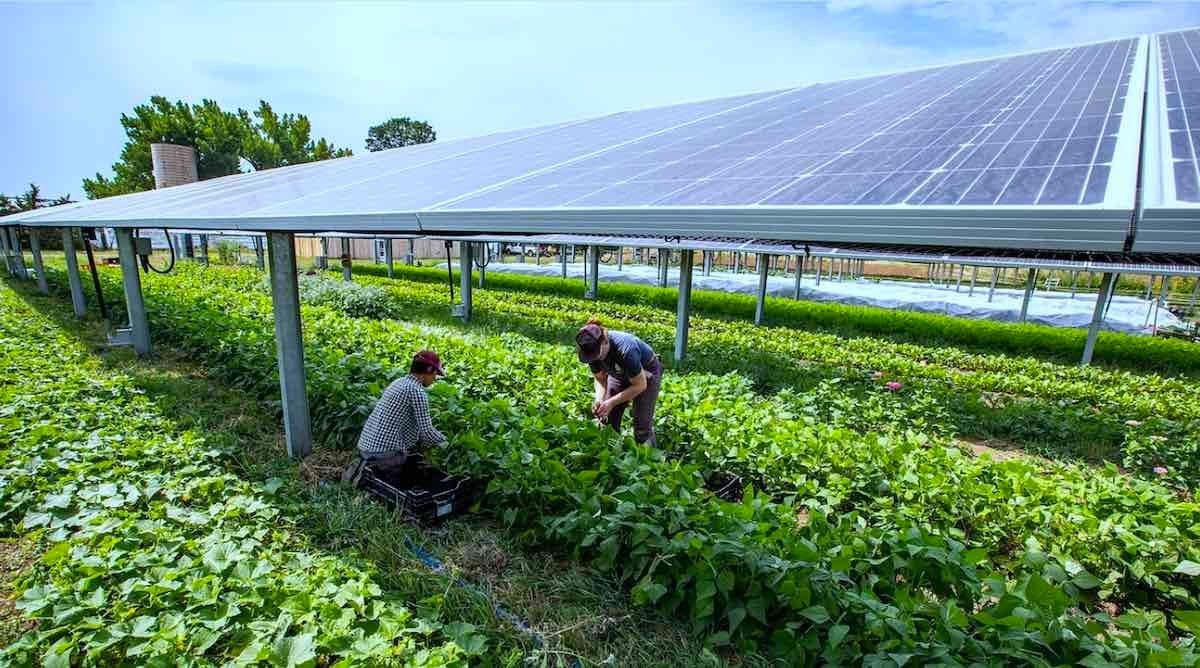Food & Climate
Pairing solar farms with growing Japanese yam, not only does the project generate clean energy, but also provides an improved growing environment for this plant, as the solar modules reduce soil moisture evaporation and shade.
A new agrivoltaic solar project has begun commercial operations in Japan that combines solar modules with a yam crop that thrives in the shade.
The agrivoltaic project is only small – just 2.4 MW – and is located in the city of Fukuchiyama in Japan’s northern Kyoto Prefecture, but is a demonstration of the new way of thinking about the use of solar projects and existing farmland.
The Fukuchiyama project is paired with the cultivation of the Japanese yam, also known as ebi-imo, a crop native to the region which thrives in shade, according a report seen by “Food & Climate” platform.
The solar modules are mounted at a minimum height of 2.35 metres above the ground, allowing plenty of space for the use of agricultural machinery, ensuring that agricultural operations can continue unaffected, according to “renew economy”.
Severe restrictions on land usage
Importantly, in a country with severe restrictions on land usage – with renewable energy projects often losing out to the need for agricultural space – this agrivoltaic project serves as a proof point for how renewable energy technologies can be paired effectively with agriculture, like growing Japanese yam.
However, the Japanese authorities have suspended feed-in tariffs (FITs) and premiums for 342 agrivoltaic projects.
Japan’s Ministry of Economy, Trade and Industry (METI) said that the Agency for Natural Resources and Energy (ANRE) has suspended FITs and feed-in premiums (FIPs) for 342 agrivoltaic power plants. The plants reportedly violated the revised Agricultural Land Act, which introduced stricter limits on deploying solar facilities on agricultural land in April.
The agency also suspended incentives for these projects because they either failed to continue farming properly after installing the PV system or did not obtain farmland conversion permission within the three-year deadline after receiving the FIT or FIP contract.
But the National Legislature of Japan (also referred to as the National Diet) is currently deliberating on the revision of the Basic Agricultural Law. The move will mark the first full-scale revision to the basic law that governs agriculture policy, since its enactment in 1999.
These debates are taking place amidst the supply disruptions induced by the climate crisis and the ongoing wars and conflicts – leading to a situation that the UN has referred to as the world’s worst hunger crisis.
Peasant movements in Japan, such as the family farmers’ movement Nouminren (a member of La Via Campesina), argue that these amendments would be counterproductive to the proclaimed governmental goal to improve self-sufficiency.
Food self-sufficiency
Since the 1960s, Japan’s food self-sufficiency rates have steadily declined. Nouminren points out that years of progressive liberalization and market reforms have led to increased dependency on agricultural imports. For instance, Japan’s grain production declined from 82% in the 1960s to a mere 29% by 2022. National meat production slid from 91% to 53% during the same period. Similar trends can be seen across other farm produce (see the chart).
Approximately 90% of the fertilizers, animal feed, vegetable seeds, and petroleum required for agricultural production are imported. If these cannot be imported, the self-sufficiency rate drops to 10%, they point out, according to “campesina”.
They have also pointed out that through amendments, attempts are being made to downgrade self-sufficiency targets. The onus of improving self-sufficiency, the movement alleges, is also being shifted from the State to the citizens.
In times of food crisis, the proposed amendments would invoke the Emergency Food Supply Law (Food Supply Difficulty Response Law), wielding penalties to farmers for crop conversion (from flowers/grass to potatoes) and imposing “allocation and distribution” of food on citizens. During “particularly severe stages,” producers could be instructed to shift to calorie-focused production (potatoes, rice) with fines of up to 200,000 yen for non-compliance.
The policy pursued by the Kishida administration, Nouminren warns, aligns with the “creation of a country prepared for war,” echoing the “wartime food law,” which mandates forcibly producing potatoes on farms and having the populace endure hunger by eating potatoes

While the current Basic Law states the need to “increase domestic agricultural production as a basic principle, and to appropriately combine this with imports and stockpiling,” Japan has continued to neglect increasing domestic agricultural production and has pursued further importation and liberalization.
While the current Basic Law states the need to “increase domestic agricultural production as a basic principle, and to appropriately combine this with imports and stockpiling,” Japan has continued to neglect increasing domestic agricultural production and has pursued further importation and liberalization.

